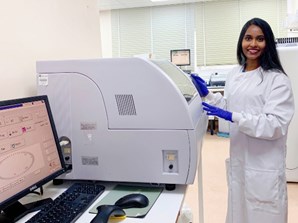Nithya Paranthaman

Nithya Paranthaman is a second-year PhD student in our Division of Molecular Pathology. She is developing and optimising micro-sampling techniques to monitor multiple myeloma – specifically a blood-sampling tool that patients can perform from the comfort of their own home.
What is your educational/work background?
I completed an undergraduate degree in neuroscience and a Master’s degree in biology, after which I worked for major pharmaceutical companies, including Novartis (East Hanover, New Jersey) and Sanofi-Genzyme (Framingham, Massachusetts).
Why did you want to study at the ICR?
The sheer complexity of addressing problems in healthcare and the potential this has for improving human lives inspired me to pursue a PhD at the ICR. The ICR gives students a unique research training environment through its collaboration with partner hospital The Royal Marsden.
My project is funded through the Biomedical Research Centre at The Royal Marsden and the ICR, bridging the worlds of research and the clinic.
Talk us through your typical day
The first part of my PhD project is very lab-based. I am currently working to optimise and validate micro-sampling techniques to monitor multiple myeloma – planning and performing experiments to compare traditional venepuncture methods to new micro-sampling methods.
Once we have developed new methods to monitor multiple myeloma in the lab, I will have the opportunity to work more closely with patients in The Royal Marsden myeloma clinics. As a Biomedical Research Centre funded student, a key aim for me in my work is to see my research embedded into routine clinical practice.
What big projects are you working on?
I am exploring a technique in which patients can send in blood samples from the comfort of their own home, rather than frequently travelling to clinics to have their blood drawn.
Routine blood tests are crucial for multiple myeloma management. Depending on how active the myeloma is, patients can have blood tests done as often as bi-weekly. As many myeloma patients are elderly and suffer from debilitating symptoms, such as bone pain and fatigue, this new test could potentially alleviate the stress of travelling and improve patient care. We aim to develop a micro-sampling kit and implement micro-sampling testing into routine clinical practice.
What are you most proud of?
I packed up all my bags and moved to the UK from the States the week before I joined the ICR. It’s been quite the transition but I think our best opportunities lie outside of our comfort zone. I encourage everyone to take that extra step because we are all capable of so much more than we’ve ever believed!
How do you take part in life at the ICR outside your studies?
I am an active member of the Student Committee. It’s been a great way to meet colleagues and have fun outside of work. We’re always up to new adventures whether it’s ice skating at the Natural History Museum, cycling along beaches, or visiting iconic UK landmarks like the Durdle Door!
Who do you collaborate with at the ICR and elsewhere?
We work closely with The Binding Site, the company that developed one of the assays recommended to monitor multiple myeloma.
We also work closely with the Consultant Haematologists at The Royal Marsden.
What opportunities has studying at the ICR given you?
Having the opportunity to conduct my research in a clinical setting has been incredible. Walking into the hospital every morning reminds me of the importance of my project.
What's your favourite part of life at the ICR?
I am constantly challenged and supported at the ICR. I’ve certainly grown as an individual and a researcher throughout my time here. The fast-paced environment definitely keeps me on my toes and I look forward to pushing my limits further.
What do you do to wind down?
London is full of culture. As an international student, I’m always exploring this beautiful city! When I’m not at work, you can probably find me at a café in Central sipping on tea and indulging my sweet tooth.